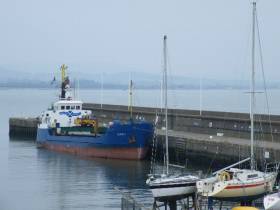Displaying items by tag: Scottish round timber
Detained Scottish Timber Trading Cargoship Finally Departs Port
#Detained- A cargoship from Scotland that was detained in Wicklow Port for a more than a week including St. Patrick's Day, finally departed last night bound for Belfast, writes Jehan Ashmore.
The 674 tonnes Burhou I was detained by Port State Control at Wicklow Port, having discharged a cargo of round timber from Kyle of Lochalsh in western Scotland. This is a regular trade to the port as featured previously on Afloat.
Burhou I is a Belize flagged small coaster which was detained following an inspection by authorities. The detention surrounded a single technical deficiency to resolve, before the ship departed yesterday in the early evening.
The detention of the 58m long Burhou I involved having to shift berths within Wicklow Harbour. This led to the cargoship berthing alongside the non-commercial East Pier.
It is from this vantage point where spectators gather to watch the Round Ireland Yacht Race hosted by the nearby Wicklow Sailing Club located at the foot of the pier.
The veteran cargsoship built by a German yard in 1978 is a sister of Isis (see, visit to Ramsey, Isle of Man). Both coasters have self-loading and discharging capabilities to transport a variety of cargoes among them timber felled in Scotland.
These coasters regularly trade throughout the Irish Sea and also to ports in south-west England. In addition they provide a domestic freight service to the smaller harbours in the Scottish Outer Isles.
Also in the port during the week was the 82m long Nestor. This was only the second call to the port of the 2,452 tonnes cargoship that loaded scrap metal in recent days and departed for Liverpool.
























































